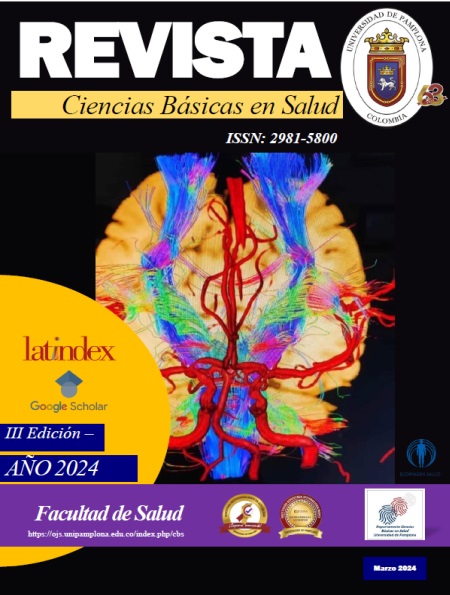Estrategia educativa para contribuir al desarrollo en la primera infancia, basada en las actividades rectoras
DOI:
https://doi.org/10.24054/cbs.v2i1.2767Palabras clave:
educación, niños, padres, promoción, desarrolloResumen
Introducción: los años de la primera infancia, son fundamentales para el desarrollo de los niños. Todo lo que el infante toca, ve, prueba, oye, huele, favorece su capacidad de pensar y aprender, haciendo responsables de su cuidado a sus padres, buscando la protección, educación y manejo de seguimiento en salud para la supervisión de que su crecimiento y desarrollo sean acordes a su edad. Objetivo: Desarrollar una estrategia educativa orientada a padres de familia para contribuir al desarrollo en la primera infancia de los niños de la Provincia Guanentina ante los efectos de la pandemia por Covid 19. Metodología: el estudio se realizó en dos fases: una diagnóstica, un estudio descriptivo de corte transversal que determinó el crecimiento y desarrollo de niños con edades en la primera infancia y la valoración de parámetros antropométricos. La fase de intervención, con el diseñó de una estrategia educativa, orientada a padres de familia. Se desarrolló en nueve municipios de Santander seleccionados aleatoriamente, incluyendo a 143 niños. Resultados: se realizó la caracterización de la población infantil, se establecieron características antropométricas de la población, se determinaron condiciones fisiológicas y valoración física y alteraciones en el crecimiento y desarrollo, también se construyó estrategia educativa (cartilla). Conclusiones: el aporte que desde enfermería y educación se pueda brindar a los padres y familias de niños en la primera infancia con la creación de estrategias centradas en sus habilidades y capacidades para potenciarlas será fundamental en el desarrollo integral de los niños.
Descargas
Referencias
Bello, S. (2020). La actividad rectora del arte para fortalecer la dimensión socioafectiva en la educación inicial. Universidad Santo Tomás; https://repository.usta.edu.co/jspui/bistream/11634/31703/1/2021samarabello.pdf
Caballero, H; Pérez, J. (2022). Actividades rectoras del MEN y ecoteología: una propuesta desde y para la casa común. Revista de la Universidad de La Salle, (87), 59-90. 2022. https://ciencia.lasalle.edu.co/ruls/vol2021/iss87/4/
Carrillo, R. (2016). Escribir en educación inicial: una realidad a partir de la lectura y las actividades rectoras de la educación inicial. Universidad de La Sabana; https://repositoriosed.educacionbogota.edu.co/bitstream/handle/001/2970/Tesis%20Rosa%20Elena%20Carrillo%20Carrillo.pdf?sequence=1&isAllowed=y
Departamento Nacional de Planeación (2022) Primera Infancia. https://www.dnp.gov.co/programas/desarrollo-social/pol%C3%ADticas-sociales-transversales/Paginas/primera-infancia.aspx
Escobar, K. (2021). Las actividades rectoras de la primera infancia, mediadoras en el reconocimiento y gestión de emociones en los niños. https://repository.unad.edu.co/handle/10596/40852
García M, Conde E, Marmol M. Adelante (2021). Cuadernos de Educación y Desarrollo. https://www.eumed.net/uploads/articulos/9bd63f2633a2f225ba91a8aa24812c46.pdf
Ministerio de Educación Nacional (2009). Desarrollo infantil y competencias en la primera infancia. Disponible en https://www.mineducacion.gov.co/primerainfancia/1739/articles-178053_archivo_PDF_libro_desarrolloinfantil.pdf
Ministerio de educación (2017). Bases Curriculares para la Educación Inicial y Preescolar. https://www.mineducacion.gov.co/1759/articles-341880_recurso_1.pdf
Ministerio de Salud (1993). Resolución 8430. https://www.minsalud.gov.co/sites/rid/Lists/BibliotecaDigital/RIDE/DE/DIJ/RESOLUCION-8430-DE-1993.PDF
Ministerio de Salud y Protección Social (2016). Escala Abreviada de Desarrollo-3. https://www.minsalud.gov.co/sites/rid/Lists/BibliotecaDigital/RIDE/VS/PP/ENT/Escala-abreviada-de-desarrollo-3.pdf
Monge M, Méndez M, Hernández M, Quintana C, Presa de La Fuente E (2019) Importancia del juego en los niños. Canarias Pediátrica. Enero - abril 2019. Vol. 43- 1. file:///C:/Users/qmarc/Downloads/Dialnet-LaImportanciaDelJuegoEnLosNinos-7186932.pdf
Organización Mundial de la Salud (2022). Sobre Atención Integrada a las Enfermedades Prevalentes de la Infancia (AIEPI). https://www3.paho.org/spanish/ad/dpc/cd/imci-aiepi.htm#:~:text=La%20AIEPI%20es%20una%20estrategia,la%20familia%20y%20la%20comunidad
Pabón Rodríguez, M, Ospino Gómez, D (2019). Actividades rectoras (juego y exploración del medio) orientadas al fortalecimiento del enfoque educativo ambiental en preescolar. Universidad de la Costa; https://repositorio.cuc.edu.co/bitstream/handle/11323/5935/Actividades%20rectoras%20%28juego%20y%20exploraci%c3%b3n%20del%20medio%29%20orientadas%20al%20fortalecimiento%20del%20enfoque%20educativo%20ambiental%20en%20preescolar%20.pdf?sequence=1&isAllowed=y
Suárez P, Vélez M. (2018) El papel de la familia en el desarrollo social del niño: una mirada desde la afectividad, la comunicación familiar y estilos de educación parental. Rev. Psicoespacios, 12(20): 173- 198, Disponible en https://doi.org/10.25057/issn.2145-2776
UNICEF (2018). Aprendizaje a través del Juego. https://www.unicef.org/sites/default/files/2019-01/UNICEF-Lego-Foundation-Aprendizaje-a-traves-del-juego.pdf
UNICEF (2022) La primera Infancia importa. https://www.unicef.org/es/la-primera-infancia-importa.
UNICEF (2022). Los estragos que la pandemia de COVID-19 ha causado a los niños del mundo. https://www.unicef.org/es/coronavirus/estragos-pandemia-covid19-ha-causado-ninos-mundo
Descargas
Publicado
Número
Sección
Licencia
Derechos de autor 2024 Revista Ciencias Básicas en Salud

Esta obra está bajo una licencia internacional Creative Commons Atribución-NoComercial 4.0.







